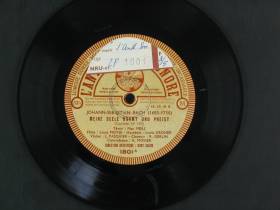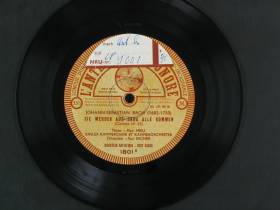 
Max Meili
Born: December 11, 1899 - Winterthur, Switzerland
Died: March 17, 1970 - Zürich, Switzerland
The Swiss tenor, Max Meili, studied singing with the famous Felix von Kraus in Munich.
Max Meili could be characterised then as concert and oratorio singer, whereby he dedicated himself particularly to the interpretation of early music and compositions from the Baroque era. The taste of his delivery, the refinement of the text treatment and the nuance-rich beauty of his voice were emphasised with his appearances in his homeland as well as in Germany, Austria, France and other countries. He rendered great services as a joint founder in 1933 of the Schola Cantorum Basiliensis, with which he undertook together expanded concert tours.
Max Meili was estimated as J.S. Bach and Georg Frideric Handel interpreter, and at the same time for his important educational activity. In 1955 he created the Collegium Cantorum Turicense, which performed under his direction the music of Monteverdi and Heinrich Schütz on international level. He was considered as a specialist for medieval vocal music, of works of the acres new facts, the Troubadours, Trouvères and the Minnesänger. As an opera singer he appeared only rarely. In 1936 and 1937 he appeared at the Salzburg Festival as a concert singer, from 1932 to 1937 he made guest appearances in Berlin, in 1947 at the Openhaus of Zürich. In May 1931 he took part at the Gärtnerplatztheater Munich in the premiere of the opera Die Mutter by A. Hába.
Paul Sacher (28 April 1906 – 26 May 1999) was a Swiss conductor, patron and impresario.
He studied under Felix Weingartner among others. In 1926 he founded the Basel Chamber Orchestra (Basler Kammerorchester) to play works written before the classical period and modern works. Immensely wealthy, he commissioned works from many well known composers, including Igor Stravinsky (who provided him with the Concerto in D), Béla Bartók (the Divertimento for Strings, String Quartet no.6, and the Music for Strings, Percussion and Celesta), Arthur Honegger (many works, including the Second Symphony and the Fourth Symphony (Deliciae Basilienses ), Frank Martin (six works, including the Petite Symphonie Concertante), Paul Hindemith, Hans Werner Henze, Richard Strauss, Elliott Carter, Witold Lutoslawski (Sacher Variation, Double Concerto, Chain 2, etc) Henri Dutilleux and Harrison Birtwistle. Pierre Boulez's Messagesquisse was one of a number of pieces written in order to celebrate Sacher's seventieth birthday and which includes the Sacher hexachord (Eb=Es A C B=H E D=Re). Boulez's Grawemeyer Award winning work Sur Incises was written for Sacher's 90th Birthday. Also, Boulez's entire catalogue (including drafts) was bequeathed to the Paul Sacher Foundation. Henze dedicated his Tenth Symphony as an in memoriam to Sacher, who had commissioned it but died before it was completed.
In 1983 Sacher acquired the Stravinsky estate. The Paul Sacher Stiftung (Foundation) is located in the centre of Basel (in Munsterplatz) and houses one of the worlds most important collections of musical manuscripts. Most of these collections were purchased by Sacher during his lifetime, and they include complete collections by several of the most important composers of the twentieth century (Lutoslawski, Ligeti, Boulez, et al.).
He was named the world's third richest man in the 1990s, having married the heiress of the pharmaceutical company, Hoffmann-La Roche. At the time of his death he was reputed in various publications to be the richest man in Europe.
Georg Melchior Hoffmann
Born: c1679 - Bärenstein, near Dresden, Saxony, Germany
Died: October 6, 1715 - Leipzig, Germany
The German composer and organist, Georg Melchior Hoffmann, received his musical training as a choirboy (Kapellknabe) in the Dresden Hofkapelle from Johann Christoph Schmidt. He went to Leipzig in autumn 1702 and enrolled at the university to study law. He also joined the student collegium musicum founded by Georg Philipp Telemann.
When Telemann left Leipzig in June 1705, Hoffmann succeeded him as organist and music director of the Neukirche, and took over as director of Telemann's Collegium Musicum (later to be taken by J.S. Bach). He was also conductor of the Leipzig civic opera, which had been in existence since 1693 and for which he wrote a number of works, and conducted in Leipzig public concerts and the Operntheater. In 1709 he met the violin virtuoso Johann Georg Pisendel, who became leader of the orchestra of Hoffmann's Collegium. At this time the ensemble consisted of 50 to 60 musicians and had won fame and recognition beyond the Leipzig area. [note the size of this ensemble!]
Hoffmann seems to have visited England between 1709 and 1710, but no details are known. During a longer stay in England he was represented by J.G. Pisendel in Leipzig. There is no definite evidence of a visit to Italy in 1714 either, and it is unlikely that he went there. In 1713 he applied, along with J J.S. Bach and three other candidates, to succeed Friedrich Wilhelm Zachow as organist at the Liebfrauenkirche in Halle. When J.S. Bach eventually declined the appointment on March 19, 1714 the Halle consistory offered it to Hoffmann, but although he officially accepted the post he never took up his duties in Halle, and in fact resigned on 23 July. On September 9, 1714 he married Margaretha Elisabeth Philipp and in the same month became one of the few Leipzig musicians of the time to be granted citizenship. He had been suffering from a serious illness since 1713 and died on the evening of October 6, 1715, aged only 36. He was buried in the Johannisfriedhof in Leipzig on October 10; all the pupils of the Thomasschule attended the funeral.
Hoffmann died a prosperous citizen, regarded by his contemporaries as an important composer and a sensitive musician. The Leipzig chronicler Christoph Ernst Sicul described him in an obituary as 'a famous composer', whose collegium musicum had produced many fine musicians holding prominent positions as organists or in the Kapellen of major German courts.
Gottfried Heinrich Stölzel, a member of Hoffmann's collegium from 1707 to 1710, and the Darmstadt court poet Georg Christian Lehms also paid tribute to Hoffmann's great importance in their writings, and Charles Burney regarded him as one of the finest composers of the first half of the 18th century. In spite of his early death Hoffmann left a quite extensive body of work, although only a fraction of it has survived. Very little from his secular output, and in particular from his operas, is extant, and his music only began to attract attention from musicologists when three works previously attributed to J.S. Bach (BWV 53, BWV 189 and BWV Anh. 21) were recognized as being by Hoffmann (or, in the case of BWV 53, probably by him). In older studies Hoffmann has often been confused with the Breslau composer Johann Georg Hoffmann.
Melchior Hoffmann's music shows a feeling for unusual and effective orchestration. His cantata and opera arias are notable for their pleasant, attractive and accessible melodies, sometimes with a strong emotional emphasis, as in the cantata Meine Seele rühmt und preist. His later compositions show Italian influence.
J.S. Bach (Georg Melchior Hoffmann?): Cantata # 189 'Meine Seele ruhmt und preist'
Louis Moyse (Flute) Louis Gromer (Oboe) J. Pasquier (Violin) Ruggero Gerlin (Harpsichord) A. Mosser (Contrabass) Tenor: Max Meili Rec.: 1935 J.S. Bach: Cantata BWV 65 'Sie Werden aus Saba alle kommen'
Tenor: Max Meili Balser Kammerchor and Kammerorchester Conductor: Paul Sacher Rec.: 1935 |

